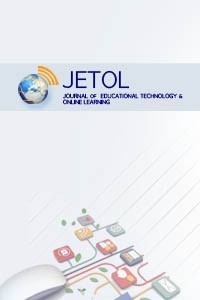Reflective writing in the pandemic period: A university students’ reflection
Reflective writing in the pandemic period: A university students’ reflection
online learning, thesis reflective writing, students’ reflection, pandemic,
___
- Boud, D., & Falchikov, N. (2006). Aligning assessment with long-term learning. Assessment and Evaluation in Higher Education, 31(4), 399-413.
- Bovermann, K., Weidlich, J., & Bastiaens, T. (2018). Online learning readiness and attitudes towards gaming in gamified online learning – a mixed methods case study. International Journal of Educational Technology in Higher Education, 15(1), 27, https://doi.org/10.1186/s41239-018-0107-0.
- Cisero, C. (2006). Does reflective journal writing improve course performance? College Teaching, 54(2), 231-236.
- Clarke, M. (2004). Reflection: journals and reflective questions: a strategy for professional learning. The Australian Journal of Teacher Education, 29(2), 1-13.
- Cornish, M. M., & Cantor, P. A. (2008). Thinking about thinking: It’s not just for philosophers. Journal of Early Childhood Teacher Education, 29(4), 326-339.
- Dewey, J. (1910). How We Think. Boston: D.C. Heath and Co. Publishers.
- Dyment, J. E., & O’connell, T. S. (2014). When the ink runs dry: implications for theory and practice when educators stop keeping reflective journals. Innovative Higher Education, 39(5), 417-429.
- Farrah, M. (2012). Reflective journal writing as an effective technique in the writing process. Najah University Journal Research, 26(4), 1-29.
- Gordijn, F., Eernstman, N., Helder, J., & Brouwer., H. (2018). Reflection Methods Practical Guide for Trainers and Facilitators. Belanda: Wageningen University & Research.
- Gorlewski, J., & Greene, K. (2011). Research for the classroom: the power of reflective writing. The English Journal, 100(4), 90-93.
- Jasper, M. A. (2005). Using reflective writing eithin reserrach. Journal of Research of Nursing, 10(3), 247-260. Jensen, K. (2010). The panoptic portfolio: Reassessing power in process-oriented writing instruction. JAC: A Journal of Rhetoric, Writing, Culture, and Politics, 30(1), 95-141.
- Jung, J. (2011). Reflective writing’s synecdochic imperative: process descriptions redescribed. College English, 71(6), 628-647.
- Kember, D., McKay, J., Sinclair, K., & Wong, F. K. (2008). A four-category scheme for coding and assessing the level of reflection in written work. Assessment and Evaluation in Higher Education, 33(4), 369-379.
- Lawrence, H. (2013). Personal, reflective writing: a pedagogical strategy for teaching business students to write. Business Communication Quarterly, 76(2), 192-206.
- Livingstone, K. A. (2019). Reflective Essay on Learning and Teaching. International Journal of Arts and Social Science, 2(5), 57-65.
- Lyons, N. (2010). Handbook of reflection and reflective inquiry: Mapping a way of knowing for professional reflective inquiry. New York, NY: Springer.
- Malthouse, R., & Roffey-Barentsen, J. (2013). Reflective Practice in Education and Training Second Edition. Bodmin: MPG Books Group.
- Negretti, R. (2012). Metacognition in student academic writing: A longitudinal study of metacognitive awareness and its relation to task perception, self-regulation, and evaluation of performance. Written Communication, 29(2), 142-179.
- O’Connell, T. S., & Dyment, J. E. (2011). The case of reflective journals: is the jury still out? Reflective Practice, 12(1), 47-59.
- Ono, A., & Ichii, R. (2019). Business students’ reflection on reflective writing assessments. Journal of International Education in Business, 12(2), 247-260.
- Pellegrino, J. W., & Hilton, M. L. (2012). Education for Life and Work: Developing Transferable Knowledge and Skills in the 21st Century. Washington, DC: National Academies Press.
- PPRI. (2020). PPRI No 21 Tahun 2020 tentang Pembatasan Sosial Berskala Besar dalam Rangka Percepatan Penanganan COVID-19. Indonesia: Kementrian Republik Indonesia.
- Pratiwi, D. (2012). Pengajaran Reflektif sebagai Upaya Peningkatan Kualitas Pendidikan dan Profesionalisme Guru. Jurnal Manajemen Pendidikan, 1-12.
- Prosser, M., & Webb, C. (1994). Relating the process of undergraduate essay writing to the finished product. Studies in Higher Education, 19(2), 125-138.
- Purcell, D. (2013). Sociology, teaching, and reflective practice: using writing to improve. Teaching Sociology, 41(1), 5-19.
- Rais, M., & Aryani, F. (2019). Pembelajaran Reflektif Seni Berpikir Kritis, Analitis dan Kreatif. Makassar: Badan Penerbit UNM.
- Randjelovic, J., O’Rourke, A., & Orsato, R. J. (2003). The emergence of green venture capital. Business Strategy and the Environment, 12(4), 240-253.
- Ross, J. (2014). Performing the reflective self: Audience awareness in high-stakes reflection. Studies in Higher Education, 39(2), 219-232.
- Ryan, M., & Ryan, M. (2013). Theorizing a model for teaching and assessing reflective learning in higher education. . Higher Education Research and Development, 32(2), 244-257.
- Schön, D. (1983). The Reflective Practitioner: How Professionals Think in Action. New York: Ashgate Publishing. Steele, M. L. (2015). Talking back: a qualitative walking back: a qualitative study of reflective writing in a writing in a first-year college composition classroom. Ph.D. (Doctor of Philosophy) Thesis. University of Iowa. Williams, K., Woolliams, M., & Spiro, J. (2012). Reflective Writing. Reflective Writing. Basingstoke: Palgrave MacMillan.
- ISSN: 2618-6586
- Yayın Aralığı: Yılda 3 Sayı
- Başlangıç: 2017
- Yayıncı: Gürhan DURAK
Reflective writing in the pandemic period: A university students’ reflection
Herli SALİM, Susulawati SUSİLAWATİ, Muhammad HANİF
The future of education according to the fourth industrial revolution
Melody KAUMBA, Ramashego Shila Shorty MPHAHLELE, Gistered MULEYA, Francis SİMUİ
Digital citizenship and its teaching: A literature review
Factors influencing EFL students’ motivation in online learning: A qualitative case study
